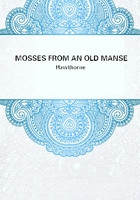
第5章 THE BIRTHMARK(5)
These questions had such a particular drift that Georgiana began to conjecture that she was already subjected to certain physical influences, either breathed in with the fragrant air or taken with her food. She fancied likewise, but it might be altogether fancy, that there was a stirring up of her system--a strange, indefinite sensation creeping through her veins, and tingling, half painfully, half pleasurably, at her heart. Still, whenever she dared to look into the mirror, there she beheld herself pale as a white rose and with the crimson birthmark stamped upon her cheek. Not even Aylmer now hated it so much as she.
To dispel the tedium of the hours which her husband found it necessary to devote to the processes of combination and analysis, Georgiana turned over the volumes of his scientific library. In many dark old tomes she met with chapters full of romance and poetry. They were the works of philosophers of the middle ages, such as Albertus Magnus, Cornelius Agrippa, Paracelsus, and the famous friar who created the prophetic Brazen Head. All these antique naturalists stood in advance of their centuries, yet were imbued with some of their credulity, and therefore were believed, and perhaps imagined themselves to have acquired from the investigation of Nature a power above Nature, and from physics a sway over the spiritual world. Hardly less curious and imaginative were the early volumes of the Transactions of the Royal Society, in which the members, knowing little of the limits of natural possibility, were continually recording wonders or proposing methods whereby wonders might be wrought.
But to Georgiana the most engrossing volume was a large folio from her husband's own hand, in which he had recorded every experiment of his scientific career, its original aim, the methods adopted for its development, and its final success or failure, with the circumstances to which either event was attributable. The book, in truth, was both the history and emblem of his ardent, ambitious, imaginative, yet practical and laborious life. He handled physical details as if there were nothing beyond them; yet spiritualized them all, and redeemed himself from materialism by his strong and eager aspiration towards the infinite. In his grasp the veriest clod of earth assumed a soul. Georgiana, as she read, reverenced Aylmer and loved him more profoundly than ever, but with a less entire dependence on his judgment than heretofore. Much as he had accomplished, she could not but observe that his most splendid successes were almost invariably failures, if compared with the ideal at which he aimed. His brightest diamonds were the merest pebbles, and felt to be so by himself, in comparison with the inestimable gems which lay hidden beyond his reach. The volume, rich with achievements that had won renown for its author, was yet as melancholy a record as ever mortal hand had penned. It was the sad confession and continual exemplification of the shortcomings of the composite man, the spirit burdened with clay and working in matter, and of the despair that assails the higher nature at finding itself so miserably thwarted by the earthly part. Perhaps every man of genius in whatever sphere might recognize the image of his own experience in Aylmer's journal.
So deeply did these reflections affect Georgiana that she laid her face upon the open volume and burst into tears. In this situation she was found by her husband.
"It is dangerous to read in a sorcerer's books," said he with a smile, though his countenance was uneasy and displeased.
"Georgiana, there are pages in that volume which I can scarcely glance over and keep my senses. Take heed lest it prove as detrimental to you.""It has made me worship you more than ever," said she.
"Ah, wait for this one success," rejoined he, "then worship me if you will. I shall deem myself hardly unworthy of it. But come, Ihave sought you for the luxury of your voice. Sing to me, dearest."So she poured out the liquid music of her voice to quench the thirst of his spirit. He then took his leave with a boyish exuberance of gayety, assuring her that her seclusion would endure but a little longer, and that the result was already certain. Scarcely had he departed when Georgiana felt irresistibly impelled to follow him. She had forgotten to inform Aylmer of a symptom which for two or three hours past had begun to excite her attention. It was a sensation in the fatal birthmark, not painful, but which induced a restlessness throughout her system. Hastening after her husband, she intruded for the first time into the laboratory.
The first thing that struck her eye was the furnace, that hot and feverish worker, with the intense glow of its fire, which by the quantities of soot clustered above it seemed to have been burning for ages. There was a distilling apparatus in full operation.
Around the room were retorts, tubes, cylinders, crucibles, and other apparatus of chemical research. An electrical machine stood ready for immediate use. The atmosphere felt oppressively close, and was tainted with gaseous odors which had been tormented forth by the processes of science. The severe and homely simplicity of the apartment, with its naked walls and brick pavement, looked strange, accustomed as Georgiana had become to the fantastic elegance of her boudoir. But what chiefly, indeed almost solely, drew her attention, was the aspect of Aylmer himself.
He was pale as death, anxious and absorbed, and hung over the furnace as if it depended upon his utmost watchfulness whether the liquid which it was distilling should be the draught of immortal happiness or misery. How different from the sanguine and joyous mien that he had assumed for Georgiana's encouragement!